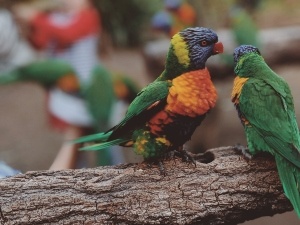
Birds can suffer illnesses and issues just the same as humans can, and just the same as humans can, birds may need help with their sicknesses and ailments
This article is a look at natural anti-inflammatories that are often used for birds
Table of Contents
Natural anti-inflammatory for birds:
Treating your bird can be a bit tricky you don’t want to give your bird medications that are not correct for the bird and you don’t want to overmedicate your bird either, natural medications are overall more forgiving.
Here are a few anti-inflammatories that are often used for birds:
Milk thistle:
Natural anti-inflammatory treatments that can be given to humans can usually be given to your birds as well, milk thistle included.
This is a herb that has both anti-inflammatory and antioxidant properties. This is usually recommended for birds who have gi issues.
Aloe vera:
This is a safe and non-toxic, readily available, and affordable plant that can be used as an anti-inflammatory agent.
This can be used as an oral medication, you can give this plant in a small cup to your bird to eat but how much you should give your bird should ideally be discussed with a vet.
You can also spray a solution (made up of one part aloe vera juice and 3 parts water) where your bird’s skin is inflamed
Note: This treatment may be recommended but you should immediately stop the treatment if the bird develops diarrhea, discomfort, or another adverse reaction from the bird.
This can be used externally for external injuries and orally for internal pain
Spices:
A variety of spices have anti-inflammatory properties. Spices that you can give your bird that has anti-inflammatory properties include turmeric, cinnamon, and cayenne.
Calendula/marigold:
This plant can be beneficial to your bird in a number of ways, not only is it a great anti-inflammatory agent, but it also helps with skin healing, is high in antioxidants, is antibacterial, antiseptic, and antifungal
Make sure that the herb is of a high quality and fresh, or, is properly preserved before giving this to your birds.
Sugar or honey:
If your bird is suffering from a prolapsed vent, and you want the swelling to go down before you decide to push the vent back in then using sugar or honey will help
The sugar or honey can be applied onto your birds vent and the swelling should go down within an hour or so
Camomile:
Not only can camomile be helpful in calming the bird and reducing anxiety, but it can also be used to calm the bird’s skin if it is swollen, inflamed, and itchy.
This treatment can be used as a spray on your bird’s skin. You can also use a warm chamomile tea teabag and gently press this against the bird’s inflamation and swelling.
How to use these treatments:
Getting your birds to eat these antiinflammatory treatments can be quite difficult.
So, if your bird isn’t keen on eating the foods listed above then it is recommended that you mix it into the bird’s food or serve it along with the bird’s favorite treats.
Note: These medications may be more gentle than commercial medications but they should still be used with caution.
If in doubt you can consult a herbologist, a vet, or better yet, an avian vet about these treatments.
If you enjoyed this article then you may also be interested in other bird related articles. Here are some articles that you may be interested in: Cockatiel Signs Of Stress, Cockatiel Temperament, Baby Bird Heat Lamp, Hand Feeding Cockatiel Problems, Why Does My Budgie Put His Foot On The Other Budgie?, Why Are My Conures Feathers Turning White?, Birds’ Feathers Curling Up

